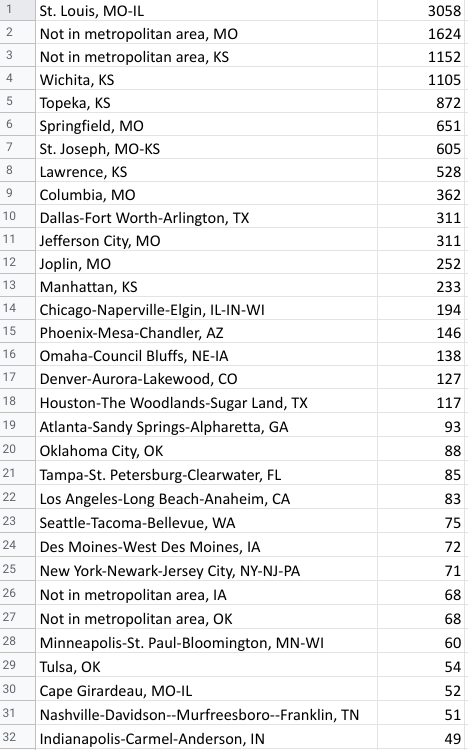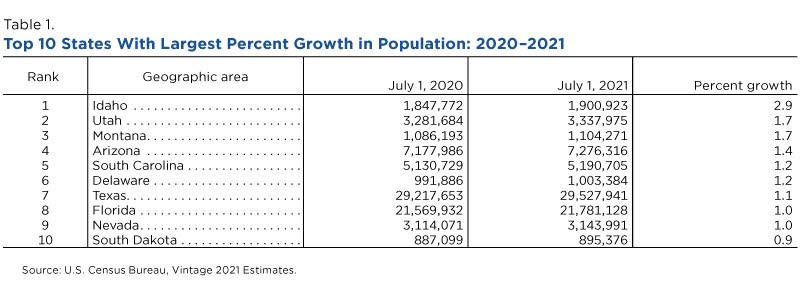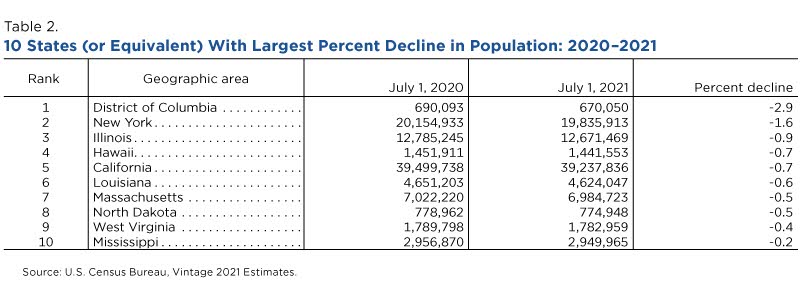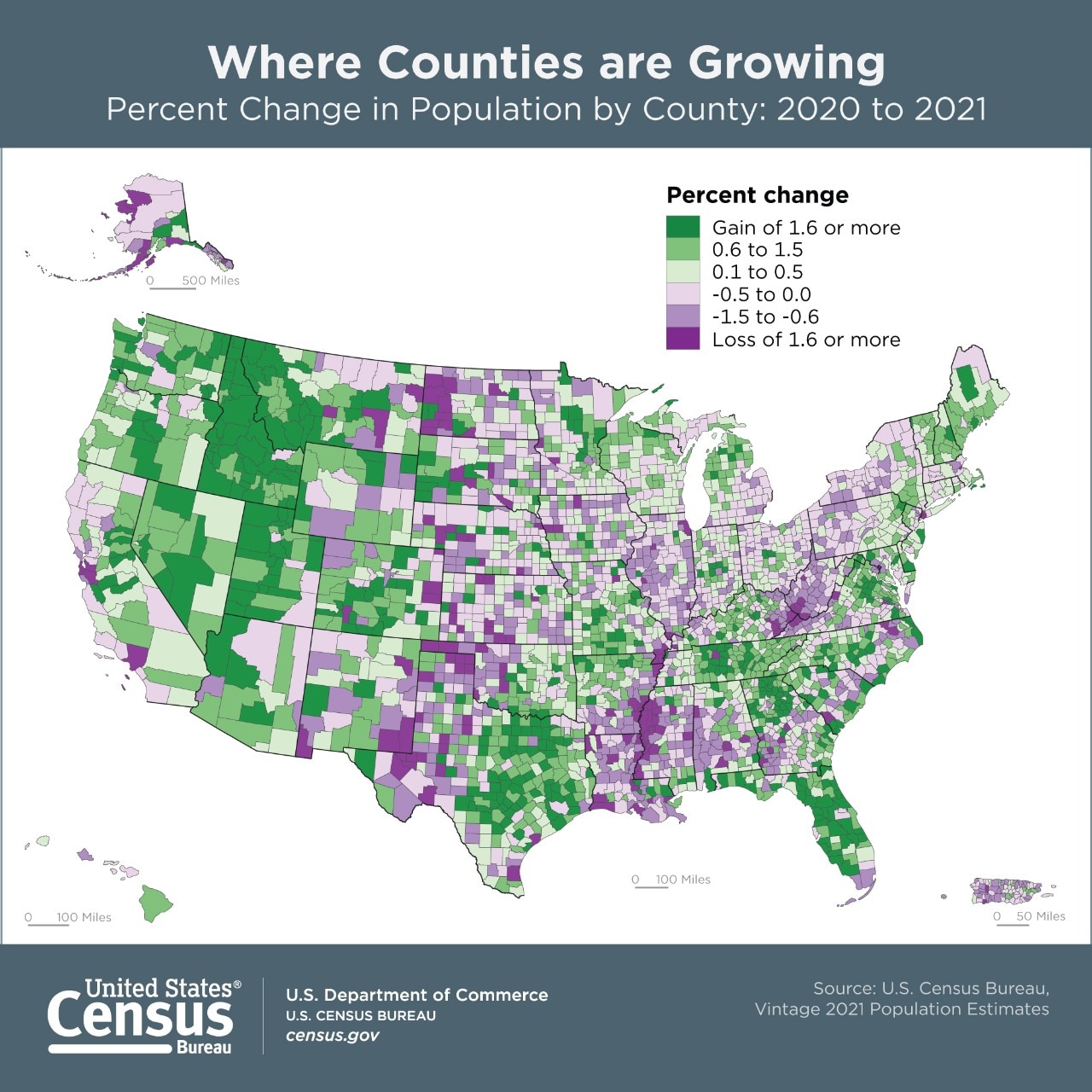Page 11 of 19
Re: KC metro growth and migration stats
Posted: Thu May 06, 2021 9:54 pm
by FangKC
I'm surprised Clay County didn't add more people.
Hasn't Chicago been losing a lot of people to Atlanta and Nashville?
Re: KC metro growth and migration stats
Posted: Fri May 07, 2021 10:19 am
by earthling
Assuming TAMU report is based on 2020 Census data (rather than ACS), keep in mind Census data was collected mid-last year. A lot of changes occurred since mid-last year. Not clear which data they are using. And data quality of several Fed agencies seem impacted by Covid. Might be another year to get a better picture.
Re: KC metro growth and migration stats
Posted: Fri May 07, 2021 10:30 am
by flyingember
earthling wrote: ↑Fri May 07, 2021 10:19 am
Assuming TAMU report is based on 2020 Census data (rather than ACS), keep in mind Census data was collected mid-last year. A lot of changes occurred since mid-last year. Not clear which data they are using. And data quality of several Fed agencies seem impacted by Covid. Might be another year to get a better picture.
2020 Census data hasn't been released at that level of detail yet
Re: KC metro growth and migration stats
Posted: Fri May 07, 2021 5:10 pm
by earthling
flyingember wrote: ↑Fri May 07, 2021 10:30 am
earthling wrote: ↑Fri May 07, 2021 10:19 am
Assuming TAMU report is based on 2020 Census data (rather than ACS), keep in mind Census data was collected mid-last year. A lot of changes occurred since mid-last year. Not clear which data they are using. And data quality of several Fed agencies seem impacted by Covid. Might be another year to get a better picture.
2020 Census data hasn't been released at that level of detail yet
Found that TAMU data comes from census.gov 'vintage' estimates. As suspected, looks like it's based on data up to June 2020.
https://www.census.gov/programs-surveys ... areas.html
"DOMESTICMIG2020 Net domestic migration in period 7/1/2019 to 6/30/2020"
Re: KC metro growth and migration stats
Posted: Sun Oct 31, 2021 1:50 pm
by normalthings
Interesting Comparison from 2020 Census
Population -
Chicago - 9,618,502
Detroit - 4,392,041
Minneapolis/ St Paul - 3,690,261
St Louis - 2,820,253
Cincinnati - 2,256,884
Kansas City - 2,192,035
Columbus - 2,138,926
Indpls - 2,111,040
Cleveland - 2,088,251
Milwaukee - 1,574,731
Population increase - 2010 to 2020 -
Minneapolis/ St Paul - 343,402
Columbus - 236,952
Indpls - 223,163
Kansas City - 182,063
Chicago - 157,397
Cincinnati - 119,217
Detroit - 95,791
St Louis - 32,552
Milwaukee - 18,823
Cleveland - 11,011
Re: KC metro growth and migration stats
Posted: Mon Nov 01, 2021 9:00 am
by earthling
Chicago metro has been shrinking the last 5 or so years and Indy/Columbus have probably been grabbing a good chunk of that as well as from rust belt regions. Clearly there may be a day that Indy/COL pass up KC if trends continue.
Re: KC metro growth and migration stats
Posted: Sat Nov 06, 2021 11:02 am
by earthling
This shows Job migration to/from places but only up to Q2/2020. It's jobs not population so population moves likely higher given families. Unclear how often this gets updated.
https://j2jexplorer.ces.census.gov/explore.html#1336980
Here are jobs moved from elsewhere
TO KC metro in Q2/2020..

Here are jobs moved
FROM KC to elsewhere in Q2/2020...

Re: KC metro growth and migration stats
Posted: Sat Nov 06, 2021 11:26 am
by earthling
^KC net gained from most of region as expected as well as STL, LA, Chicago, Denver, NYC, DC. Not surprising KC mostly net lost to the South and SW.
Re: KC metro growth and migration stats
Posted: Tue Dec 21, 2021 12:50 pm
by earthling
2021 state population estimates are out up to July. MO increased by .2% KS lost -.1%. NY State took a pretty big hit.

 https://www.census.gov/library/stories/ ... ovdelivery
https://www.census.gov/library/stories/ ... ovdelivery
MO and KS:
https://www.census.gov/quickfacts/fact/ ... /PST045221
Re: KC metro growth and migration stats
Posted: Tue Dec 21, 2021 1:38 pm
by AlkaliAxel
It’s always tough for us to judge off these though because while Kansas and MO could lose population, the KC metro could be gaining. Because many times while we gain, STL and rural Kansas are draining even more.
Re: KC metro growth and migration stats
Posted: Fri Dec 31, 2021 10:11 am
by earthling
The CEO of the Kansas City Area Development Council said...
Marketing a modern Kansas City to workers also is important. He said Kansas City is top of the market for net migration since the start of the pandemic because of increased remote work, leading people to move from more-expensive cities.
https://www.bizjournals.com/kansascity/ ... owden.html
The BLS employment/labor force data supports this as well.
Re: KC metro growth and migration stats
Posted: Fri Dec 31, 2021 1:26 pm
by AlkaliAxel
earthling wrote: ↑Fri Dec 31, 2021 10:11 am
The CEO of the Kansas City Area Development Council said...
Marketing a modern Kansas City to workers also is important. He said Kansas City is top of the market for net migration since the start of the pandemic because of increased remote work, leading people to move from more-expensive cities.
https://www.bizjournals.com/kansascity/ ... owden.html
The BLS employment/labor force data supports this as well.
I think it’s also bringing in former KC people back who were forced to work in Omaha or some piece of shit Midwest town that gladly would work here now that they can. I know 2 friends who were in that situation and back now (Chicago & Nebraska) and I’m sure many more. That’s probably a reason why rent & price keep rising in metro.
Re: KC metro growth and migration stats
Posted: Mon Feb 07, 2022 10:16 am
by kboish
This is a fun tool to estimate population of a geographic location.
https://www.tomforth.co.uk/circlepopulations/
Re: KC metro growth and migration stats
Posted: Thu Mar 24, 2022 8:16 am
by earthling
2020 to 2021 county pops change. Jackson Co shows slight loss. MSP and STL core counties show bigger losses. Several of the largest cities also show pretty significant core county losses. Might be method off tracking (different than 2020 census) rather than actual loss over year. More data to be released this morning...

Re: KC metro growth and migration stats
Posted: Thu Mar 24, 2022 9:42 am
by earthling
2020 to 2021 metro changes. KC on the upside of the 'Great Shift'.
KC metro gains near 6K, more than Denver. Indy and Columbus continue to climb faster and of course Nashville even moreso.
A bit surprising to see MSP loss as they've consistently been a strong Midwest metro. MSP job recovery below US avg as well.
https://www.census.gov/data/tables/time ... areas.html

Re: KC metro growth and migration stats
Posted: Thu Mar 24, 2022 10:57 am
by FlippantCitizen
Interesting to see Miami post negative growth despite all the talk about it in certain circles. Mostly tech and finance. Be interesting to see who's coming and who's going. Only big surprise on that list for me.
Re: KC metro growth and migration stats
Posted: Thu Mar 24, 2022 12:16 pm
by earthling
^That is odd about Miami but it may still be hot with the wealthy but not with others. Job growth not only not as good as other southern cities, it's not recovered yet.
Re: KC metro growth and migration stats
Posted: Thu Mar 24, 2022 12:17 pm
by earthling
Here is the breakdown of births/deaths and international/domestic migration from July 2020 to July 2021. The Change column is net difference of births/deaths, not overall population.
Denver had a net negative migration almost worse than STL. MSP even worse. KC grabbed a small share.

Re: KC metro growth and migration stats
Posted: Thu Mar 24, 2022 1:21 pm
by AlkaliAxel
Denver, Portland, Seattle, Miami, Minneapolis, Bay Area, Boston were all cities on the upswing last decade that are facing severe downswings here.
At first I thought KC’s was lackluster but after seeing the whole chart it looks good.
Re: KC metro growth and migration stats
Posted: Thu Mar 24, 2022 2:15 pm
by AllThingsKC
These stats are just for the one year?
I wonder if any of this is politically driven. A lot of those major cities were losses debated defunding their police forces.
Another factor is likely cost of living in the core of some of the major cities.


